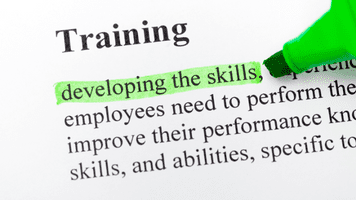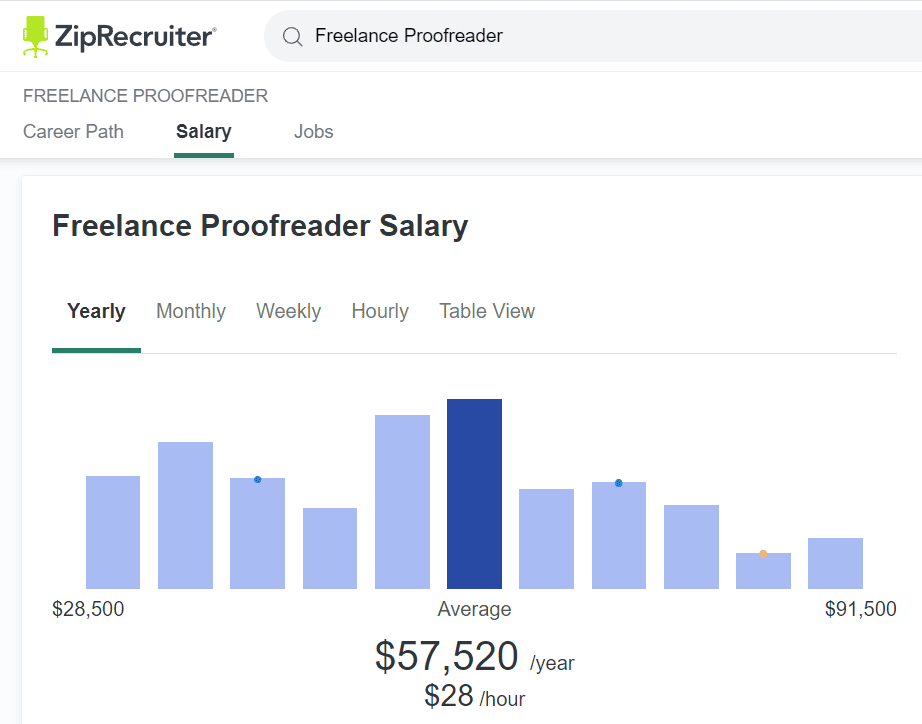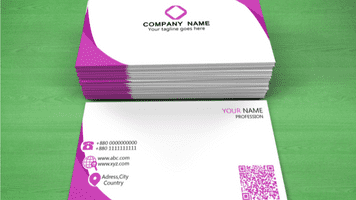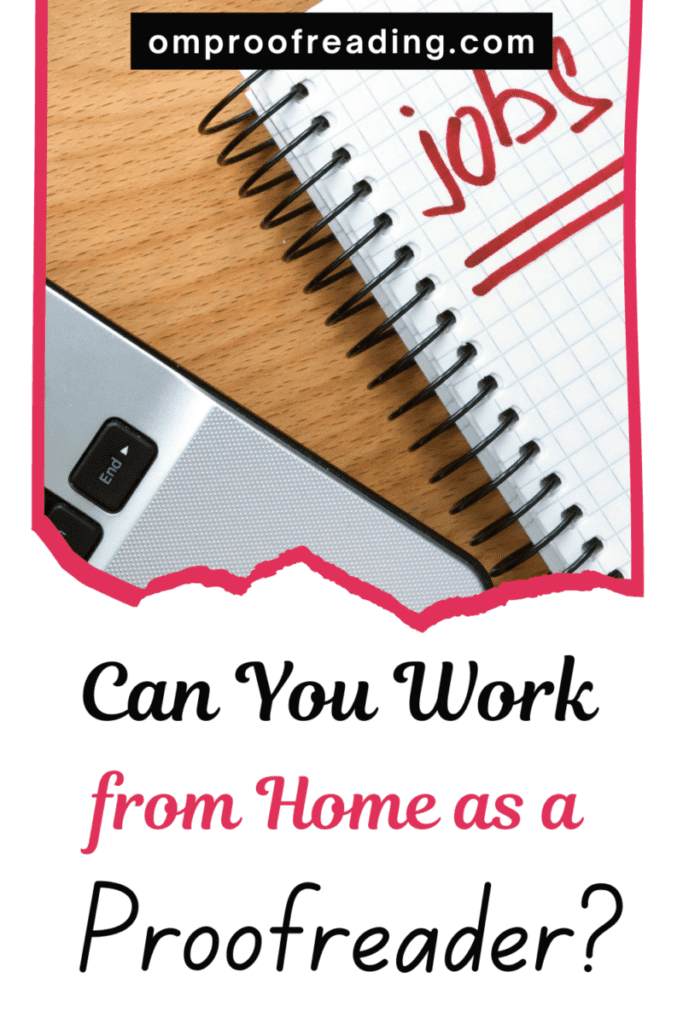This article may contain affiliate links. Please see our affiliate disclaimer in the footer menu for more information. Thank you for your support!

If you’re considering becoming a proofreader, you may wonder if you can do this job from home. As someone with experience as a proofreader, I can help you answer this question and a few others you may have. So, can you be a proofreader who works at home?
You can work from home as a proofreader to do most proofreading jobs. Although some companies (especially publishing houses) prefer to hire in-house proofreaders, many businesses hire freelancers. You can find remote jobs on freelance platforms, job boards, and the websites of online proofreading and editing companies.
Let’s see how you can become a proofreader from home, the qualifications you’ll need, and how much you can make. We’ll also look at options for remote proofreading jobs and discuss how to prepare for a proofreading test in case you ever need to take one.
How Can You Work from Home as a Proofreader?
First, let’s briefly talk about how to become a proofreader so you can take on proofreading work from your home office.
1) Know what a proofreader does and if it’s something you’d enjoy.
The word proofreading frequently gets confused with other terms like copyediting, revising, and editing. So what do proofreaders do?
Proofreaders perform the final check on a document before the public reads it. They’re responsible for finding mistakes with the following:
- punctuation
- spelling
- grammar
- capitalization
- formatting
- improper word use (e.g., weather vs. whether)
- repeated or omitted words
If you have a knack for spotting errors in other people’s writing and enjoy scrutinizing documents for mistakes, you may enjoy being a proofreader.
In addition to having eagle eyes, you’ll also want to ensure you’re comfortable working alone.
Proofreading is done solo, so you need to enjoy your own company.
You’ll also need lots of self-discipline to meet deadlines and the ability to concentrate on your work.
Finally, if you don’t enjoy reading, that’s probably a deal breaker!
If you’re unsure if proofreading is the right fit for you, I wrote an article about signs you’d make a good proofreader.
2) Figure out the type of proofreading you’d like to do.
You need to determine the kind of proofreading you want to do so you know which training option makes the most sense for you.
Most proofreading courses are geared toward general proofreading. General proofreaders work with a wide variety of documents, including short and long texts.
However, if you want to do transcript proofreading, you’ll need to take a specialized course since this type of proofreading varies considerably from general proofreading.
Transcript proofreading also has a steeper learning curve, requiring more time to master.
3) Get the training you need to succeed.

Proofreading involves a specific skill set, and you’ll want the opportunity to practice those skills and get feedback before working in the field.
Be sure to give yourself sufficient time for training, especially if it’s been a while since you studied grammar and punctuation in high school or college.
While training, you may want to consider a niche you’re interested in.
However, when you first become a proofreader, you need to be willing to work with texts about a wide range of topics—even ones that bore you.
For example, I’m a peace-loving vegan who has proofread documents about war strategy and a user manual on how to freeze meat—including details about juices flowing from the meat.
I didn’t love those jobs, but I can’t say I didn’t learn something new. 😉
I wrote an article about the best proofreading programs if you’d like recommendations for where to receive training.
4) Find entry-level proofreading jobs.
After you have the necessary know-how, you’ll want to find beginner-friendly jobs you can do from home. We’ll look at some of the best options soon.
I authored an in-depth article about becoming a proofreader if you’d like more information.
What Qualifications Do You Need to Be a Proofreader?
Before we delve into the qualifications proofreaders need, let’s briefly discuss what isn’t necessary.
You may be surprised that you don’t need a degree for most proofreading jobs.
Although some proofreaders have a degree in English, journalism, or a related field, not having one isn’t a deal breaker in most cases.
You also don’t need any formal certification. In fact, proofreading certification isn’t available in the US or UK.
Instead, you can receive a certificate for completing or passing a proofreading course.
Since you don’t need formal qualifications to become a proofreader, what do you need? You need a specific skill set.
You’ve likely already developed several relevant skills from high school, college, or previous jobs.
Om Proofreading has an article about the skills proofreaders need to have if you’re interested in reading it. However, I’ll hit the highlights here.
These are some of the skills you need to be on error patrol.
- a firm grasp of grammar, capitalization, spelling, and punctuation (of course!)
- a solid vocabulary and broad general knowledge
- willingness to learn continually (curiosity is a big plus here!)
- familiarity with at least one major style guide (e.g., The Chicago Manual of Style)
- capability to research what you don’t know
- know-how with computers and good written communication skills
- capacity to market your services and keep track of finances
How Much Can You Make as a Freelance Proofreader?
Although it’s easy to get salary info for proofreaders who work for companies, statistics for freelance proofreaders are elusive.
However, ZipRecruiter tells us that as of February 2024, the average salary of a freelance proofreader in the United States is $57,520 (roughly $28 per hour).

ZipRecruiter states that the majority of freelance proofreaders earn between $42,500 and $70,000 per year.
If you’re curious, I penned a post explaining why freelancers’ proofreading rates vary and how much proofreaders usually earn.
Proofreading Jobs from Home (No Experience Needed)

Let’s look at some of the best job opportunities for those who don’t yet have experience.
And if you’re only interested in part-time proofreading work, you’re in luck. Most of these opportunities allow you the flexibility to not be locked into a full-time position.
One of the best places to find work at first is on freelance platforms.
Freelance Platforms
- Fiverr
- Freelancer
- Guru
- Upwork
- PeoplePerHour
Although the pay isn’t great (especially in the beginning), these marketplaces offer a space to get the experience needed to score higher-paying work in the future.
Fiverr was where I started, and it allowed me to hone my skills, increase my confidence, and get client testimonials.
The advantage of these platforms is that they process all the payments and put your services in front of a lot of eyeballs—they advertise for you.
The disadvantages are the low starting pay, high competition, and having to fork over a cut of your earnings to the platform.
Another option is to look for work on job boards.
Job Boards
- FlexJobs
- Glassdoor
- Indeed
- Media Bistro
- SimplyHired
- ProBlogger
- BloggingPro
All of these boards are free to use except FlexJobs. FlexJobs is a great option, but you have to pay to access it because they screen all the companies and jobs on their platform to ensure they’re legitimate.
Also, ProBlogger and BloggingPro cater to writers, but they occasionally post jobs for proofreaders.
Now let’s look at proofreading and editing companies on the web.
Online Proofreading and Editing Companies
Let’s explore a few proofreading and editing businesses that don’t require their freelancers to have experience.
Some of these companies require you to have a degree.
Keep in mind that it can be difficult to be a freelance proofreader for some of these businesses when you start since they can be highly selective and often prefer proofreaders with experience.
Online Proofreading and Editing Companies (No Experience Required)
| Company | Degree Required? | Other Requirements? |
|---|---|---|
| Proofed | ideal, but not required | – need to pass Knowadays’ Becoming a Proofreader class and Knowadays’ Becoming an Editor course with distinction |
| ProofreadingPal | yes | –minimum requirement is to be employed by or enrolled as a grad or postgrad student (with at least a 3.5 GPA) at a US university |
| Proofessor | yes, from a UK/Ireland university | yes, please see their website |
Om Proofreading has a post about legitimate entry-level proofreading jobs if you’d like to learn about additional work opportunities offered by online proofreading and editing services.
I also created an article about book proofreading jobs you can do from home if this niche piques your interest.
Other Options for Landing Work-from-Home Proofreading Jobs
Let’s look at a few other ways to land work.
Establish a Website and Have Business Cards Made
Having your own website is always a good idea. A site shows you take your work seriously, and it’s an easy way for clients to see who you are and what you offer.
Displaying your credentials on your site will help clients trust you.

You can have business cards made and put your web address on your cards. Giving someone something tangible, like a business card, means they’re more likely to remember you in the future.
Network with Proofreaders, Editors, and Writers
Networking with writers, editors, and other proofreaders is also beneficial. You can look for relevant groups on sites like LinkedIn and Facebook. Groups with editorial professionals can be good for sharing information and getting job leads.
You may find some potential clients if you join a group for writers. Just try to be helpful, and contribute valuable information before pitching your services.
And don’t forget to create a complete profile on LinkedIn!
LinkedIn is a social network where you can connect with other professionals. You can also make your profile searchable for recruiting managers.
Here’s an excellent article from Smart Blogger about how freelancers can use LinkedIn to find work.
Cold Email Potential Clients
Finally, cold emailing possible clients can be a winning strategy with enough persistence and patience.
One way to do this is to email the owner of blogs that you vibe with. Tell them how much you enjoy their content and how it’s helped you. Then (with remarkable tact 😉) mention how your offerings could benefit them.
What about Proofreading Tests?
If you decide to be a freelancer for an online proofreading and editing company, you may be required to pass a test to be considered for the job.

Companies use these assessments because it’s a quick way to know who has the needed skills. However, these exams are usually quite challenging!
The suggestions in this post can help you improve your proofreading proficiency so you can get the best score possible on a proofreading assessment.
How to Prepare for a Proofreading Test
The best way to prepare for an exam is to take a comprehensive proofreading course that includes plenty of practice and some form of feedback. Another way to get ready is to take practice proofreading tests from various websites.
Some of these quizzes focus on a specific aspect of proofreading, and others are more general.
Here’s a post from Om Proofreading about tons of options for tests and quizzes. I’ve organized them from easiest to most difficult. I think you’ll enjoy taking them!
Remember, proofreading practice makes proofreading progress. 😊
Frequently Asked Questions
How do I start a proofreading business at home?
To begin, ask yourself why you’re starting a proofreading company. It’s a simple question, but it deserves considerable thought. You’ll want to establish goals for your business and a plan for achieving them.
Your next step will be to take a comprehensive proofreading course and ensure you have the resources you need to succeed.
Then you’ll need to come up with a name for your company, create your business website, and decide to be a sole proprietor or establish an LLC.
Finally, prior to marketing your services, it’s essential to have a system for tracking your income and expenses.
I published a thorough article that walks you through establishing a freelance proofreading company if you’d like to learn more.
Can proofreading be a side hustle?
Proofreading can definitely be a side hustle. Many people start a proofreading side job to supplement their income or earn money in retirement.
Proofreading is an ideal side gig because the start-up costs are relatively low, and you can proofread from any location with a stable internet connection.
I hope this post has answered your question about whether you can proofread from home and has given you some helpful advice for getting started on error patrol.
Best wishes to you!
“When you have exhausted all possibilities, remember this—you haven’t.”
-Thomas Edison

Recent Posts
Punctuation is important because it enables us to communicate our message clearly and effectively. Without punctuation, we wouldn’t understand how units of a sentence relate to one another or how...
Although you're probably somewhat familiar with adverbs, you may be unaware of sentence adverbs. As a trained proofreader who has studied the parts of speech, I can help you understand this unique...
